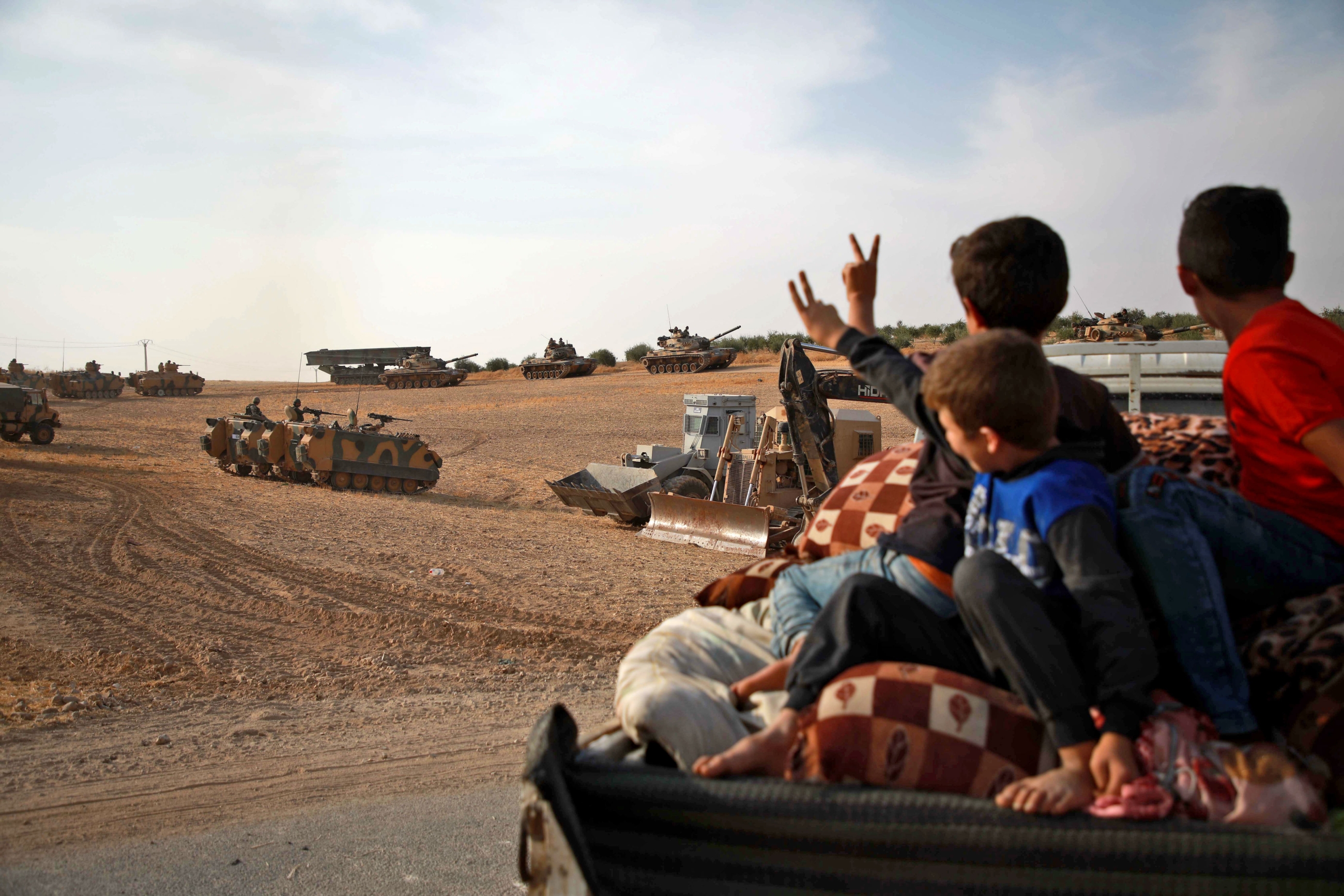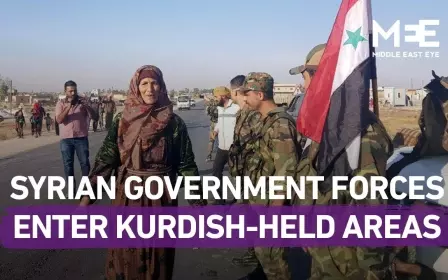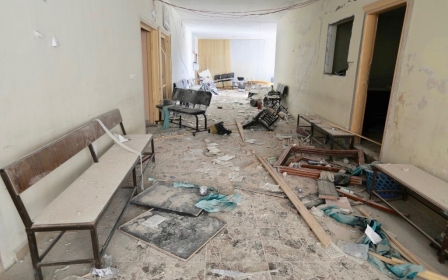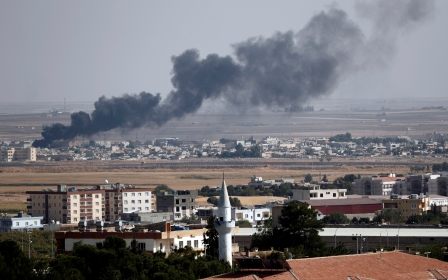United States imposes 'very strong' sanctions on Turkey over Syria offensive

Eight days after Donald Trump appeared to give the green light for a Turkish military offensive in northern Syria, the United States has imposed sanctions on various Turkish officials and government agencies over the incursion.
Top US officials also called on Turkey to end its military operation on Monday, offering to mediate between Ankara and Syrian Kurds.
Washington's sanctions will hit three Turkish government ministers as well as the ministries of energy and defence, US Treasury Secretary Steven Mnuchin said on Monday.
"The president has been very clear. These sanctions are very, very strong. He is prepared to remove these sanctions if there is the necessary action on Turkey's point," Mnuchin told reporters outside the White House.
New MEE newsletter: Jerusalem Dispatch
Sign up to get the latest insights and analysis on Israel-Palestine, alongside Turkey Unpacked and other MEE newsletters
The measures will restrict US financial dealings with the targeted Turkish individuals and institutions - with waivers for humanitarian organisations and US government departments, Mnuchin said.
The sanctions also will not affect Turkey's ability to buy fuel.
Trump slams Turkey
Earlier on Monday Trump said the United States is prepared to "swiftly destroy" Turkey's economy if Ankara continues its offensive in Syria.
The US president had decided last week to withdraw US troops from northern Syria, effectively giving Ankara a nod of approval to launch a military operation against Kurdish fighters in the area. But on Monday, he denounced the Turkish incursion.
'Unfortunately, Turkey does not appear to be mitigating the humanitarian effects of its invasion'
- Donald Trump
"Turkey's military offensive is endangering civilians and threatening peace, security, and stability in the region," Trump said in a statement.
The US president, who faced a major backlash domestically and internationally from allies and enemies alike, had announced the plan to pull US soldiers from northern Syria after a phone call with his Turkish counterpart Recep Tayyip Erdogan earlier this month.
On Monday, Trump said he had warned Erdogan that Turkey's plan will worsen the humanitarian crisis in the region.
"Turkey must ensure the safety of civilians, including religious and ethnic minorities, and is now, or may be in the future, responsible for the ongoing detention of ISIS fighters in the region," the statement said.
"Unfortunately, Turkey does not appear to be mitigating the humanitarian effects of its invasion."
Why is Turkey invading northeast Syria?
+ Show - HideWho is fighting who?
Democratic Union Party (PYD)/Peoples Protection Units (YPG)
Founded in 2003, the PYD and its military wing the YPG are the ideological sister group of the Kurdistan Workers Party (PKK), which has fought a decades-long conflict with Turkey.
Following the beginning of the Syrian civil war in 2011, the PYD managed to take control of much of the Syria's north in the security vacuum that followed.
The group claims to espouse an ideology called "democratic confederalism", based on the ideology of PKK founder and leader Abdullah Ocalan, who has been in prison in Turkey since 1999.
Turkey
Turkey has long viewed the growth of the PYD with deep concern, and a peace process between Turkey and the PKK collapsed in 2015 in part over the spread of the Syrian Kurds' influence.
Since then, Erdogan has repeated his determination that he would "never allow the establishment of a Kurdish state in northern Syria".
What does Turkey want in northern Syria?
Turkey fears that a pro-PKK entity on its southern border would inevitably become a launchpad for attacks on Turkey.
In addition, Turkey wants to expell Syrian refugees from Turkey and resettle them in a "safe zone" it plans to create in northern Syria.
Turkey has the largest refugee population in the world, and the presence of Syrians in the country has increasingly led to animosity from Turks who blame them for crime, unemployment and the dilution of Turkish culture.
What does the PYD want in northern Syria?
The PYD's long-stated aim has been the creation of a statelet on the basis of Ocalan's ideology, as well as protecting Kurdish rights.
The area controlled by the PYD, known as Rojava, has established autonomy with networks of local councils and forums that aim to promote decentralised democracy - though the group has been accused of enforcing a one-party rule in the region.
What does the US-led coalition want?
Donald Trump was elected on a platform of isolationism and has touted the defeat of IS as the sole reason for US involvement in Syria - now that has largely taken place, Trump has argued the United States has no need to remain.
The biggest fear for the US and its allies is that Turkey's takeover of PYD-controlled areas could see the release of some of the 15,000 IS fighters previously captured by the Kurds and their allies.
What does the Syrian government (and its allies) want?
The Syrian government, as well as its close allies Iran and Russia, are happy about the US' decision to withdraw from the north, but have expressed concern about the violation of Syria's sovereignty by Turkey.
Syrian President Bashar al-Assad hopes that, when faced with the threat from Turkey, the PYD will throw their lot in with him in order to avoid total defeat.
Assad has repeatedly said he aims to regain control of all of Syria, and if the PYD was to ally with him formally, it would bring the largest area hitherto out of his control back under Damascus' influence.
Dozens of members of Congress, including major figures in Trump's own Republican Party, had denounced Trump for withdrawing American soldiers from northern Syria.
The president's critics accused him of abandoning the US-backed Kurdish groups that played a major role in the fight against the Islamic State (IS) group to please Erdogan.
Turkey views Kurdish fighters in northern Syria, namely members of the People's Protection Units (YPG), as a threat to its national security.
The US president, however, appears to be backtracking from his initial neutral stance that his detractors said enabled the Turkish assault.
When the White House released a statement on 6 October announcing the US troops' pullout, it did not mention any US opposition to the planned incursion. Still, a day later Trump said the Turkish offensive was a "bad idea".
Pence to visit Turkey
US Vice President Mike Pence revealed on Monday that Trump spoke on the phone with a top Syrian Kurdish general, who voiced concerns over Turkish forces approaching the city of Kobane.
Pence added that Trump later talked to Erdogan as well, offering to mediate between Turkey and the Kurds.
'Erdogan ordered a unilateral invasion of northern Syria that has resulted in widespread casualties, refugees, destruction, insecurity, and a growing threat to US military forces'
- Mark Esper, US secretary of defence
"President Trump communicated to him very clearly that the United States of America wants Turkey to stop the invasion, to implement an immediate ceasefire and to begin to negotiate with Turkish forces in Syria to bring an end to the violence," Pence said.
Pence said Trump ordered him to travel to Turkey in the "immediate future" to help broker a ceasefire that would "bring the bloodshed to an end".
Executive order
Later in the day, the US Department of State confirmed that Trump has signed an executive order to "press Turkey to halt its military offensive against northeast Syria".
"To avoid suffering further sanctions imposed under this new executive order, Turkey must immediately cease its unilateral offensive in northeast Syria and return to a dialogue with the United States on security in northeast Syria," Secretary of State Mike Pompeo said in a statement.
Trump had said that the decree would allow sanctions against Turkish officials "obstructing a ceasefire".
"The order will enable the United States to impose powerful additional sanctions on those who may be involved in serious human rights abuses, obstructing a ceasefire, preventing displaced persons from returning home, forcibly repatriating refugees, or threatening the peace, security, or stability in Syria," Trump said in a statement.
"The order will authorise a broad range of consequences, including financial sanctions, the blocking of property, and barring entry into the United States."
The US president said he will also increase steel tariffs on Turkey and pause negotiations over a $100bn trade deal.
Pentagon says IS militants released
The defense department joined Trump in his criticism of the Turkish offensive on Monday, calling the incursion "unacceptable" and saying that it has led to the release of many Islamic State militants.
"Despite the opposition and repeated warnings from the United States and the international community, Turkish President Erdogan ordered a unilateral invasion of northern Syria that has resulted in widespread casualties, refugees, destruction, insecurity, and a growing threat to US military forces," Pentagon chief Mark Esper said in a statement.
Esper added that he will be urging Washington's Nato allies to take "collective and individual diplomatic and economic measures" against Turkey, which is also a member of the North Atlantic alliance.
Middle East Eye delivers independent and unrivalled coverage and analysis of the Middle East, North Africa and beyond. To learn more about republishing this content and the associated fees, please fill out this form. More about MEE can be found here.




